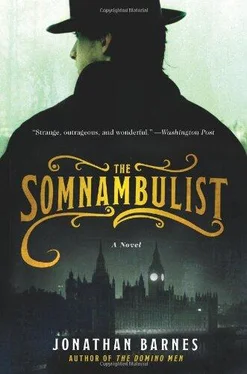Jonathan Barnes - The Somnambulist
Здесь есть возможность читать онлайн «Jonathan Barnes - The Somnambulist» весь текст электронной книги совершенно бесплатно (целиком полную версию без сокращений). В некоторых случаях можно слушать аудио, скачать через торрент в формате fb2 и присутствует краткое содержание. Жанр: Иронический детектив, Исторический детектив, на английском языке. Описание произведения, (предисловие) а так же отзывы посетителей доступны на портале библиотеки ЛибКат.
- Название:The Somnambulist
- Автор:
- Жанр:
- Год:неизвестен
- ISBN:нет данных
- Рейтинг книги:5 / 5. Голосов: 1
-
Избранное:Добавить в избранное
- Отзывы:
-
Ваша оценка:
- 100
- 1
- 2
- 3
- 4
- 5
The Somnambulist: краткое содержание, описание и аннотация
Предлагаем к чтению аннотацию, описание, краткое содержание или предисловие (зависит от того, что написал сам автор книги «The Somnambulist»). Если вы не нашли необходимую информацию о книге — напишите в комментариях, мы постараемся отыскать её.
The Somnambulist — читать онлайн бесплатно полную книгу (весь текст) целиком
Ниже представлен текст книги, разбитый по страницам. Система сохранения места последней прочитанной страницы, позволяет с удобством читать онлайн бесплатно книгу «The Somnambulist», без необходимости каждый раз заново искать на чём Вы остановились. Поставьте закладку, и сможете в любой момент перейти на страницу, на которой закончили чтение.
Интервал:
Закладка:
“Thomas Cribb,” he said and reached his left hand (unbandaged, five-fingered) across the table. One of the guards, his beefy arms folded, observed us truculently from the other side of the room.
“We’ve met before,” I said.
Something like a smile flickered across his face. “So I gather.”
“I had never previously enjoyed an opportunity to study the man at close quarters, and I cannot stress quite enough how remarkably striking was his ugliness, how compellingly repulsive.
“What do you want?” I asked.
“I want to make you a promise.”
I noticed that he had brought a newspaper with him and I caught a glimpse of its headline — a report, it seemed, of recent events beneath the Monument. I saw my own name and below it an insulting likeness of my face.
Cribb leant forward across the desk toward me. At the gesture, the guard unfolded his arms and reached instinctively for the truncheon which hung from the belt at his waist. The ugly man fixed me with his most piercing gaze.
“I do not care to see my city threatened,” Cribb said.
“ Your city?”
“I promise to do everything in my power to stop you. I’ll help this…” He glanced down at the paper as if to check some minor detail: “This Edward Moon. I’ll teach him how to thwart you.”
I yawned. “Sorry. Don’t follow.”
“I’ll guide him. Use him to ensure you don’t succeed.”
I grinned at the guard. “Maybe he ought to be in here with us,” I quipped, and gratifyingly, the man smirked in response.
“I’ve built up a good rapport with my gaolers. I think they’ve taken to me and I suspect that many of them (though it would be more than their jobs are worth to admit it) know that I really shouldn’t be in here at all.
My visitor rose to his feet. “By the way,” he said, “history will not remember you.”
I chose not to reply to this last, childish barb and Thomas Cribb walked silently away.
Perhaps, in retrospect, I should have said more, kept him talking, found out more about his claims. As it was, I never saw him again.
Frankly, I don’t consider it a great loss. There was always something so bloody smug about the man.
A week passed before I received my second visitor (I say a week; of course, it might just as easily have been a fortnight or a month). You’ll think it strange, and at the time it certainly surprised me, but even after everything he’d done, some part of me was actually pleased to see him.
“Edward,” I said, and smiled.
For a man who had suffered so much, he looked well. A little older, perhaps, grayer, with some of the swagger out of him, and some of his vanity, his preening self-confidence, satisfyingly punctured. All in all, I thought it an improvement.
We sat in silence for a while.
“Why have you come?” I said at last.
“I need to ask you something.”
“Anything,” I said, perhaps a trifle overeager.
“I need to know why.”
To my — and I suspect to our — surprise, his visits became a regular fixture.
I like to think we both gained a good deal from the encounters. I tried my utmost to give him an insight into what I had intended to achieve (though, needless to say, I was never actually able to convert him) and he brought me news from the outside world, about what had happened after I was led away in chains. Between us we were able to stitch together a complete overview of events, a comprehensive narrative of all that had transpired in the months leading up to the battle of King William Street Station.
The body of the Somnambulist has yet to be found. In a conviction born of grief, Edward has come to believe that the giant still lives, that he sleeps somewhere beneath the surface, waiting, Arthur-like, for the city’s hour of need. It might be of some interest to you that when I last saw him, Moon had begun to hold some eccentric notions as to his friend’s identity. He showed me a postcard which depicted the two giant stone statues that guard the Guildhall — Gog and Magog, as Cribb correctly identified them — and swore that he recognized something of the Somnambulist in their features. Personally, I could never see the resemblance.
Publicly, Moon announced him dead. There was even a funeral, though it was sparsely attended and I was not invited. The inspector was there, along with Charlotte, Mrs. Grossmith, a few well-wishers and general idlers. They used an empty coffin (constructed to unusually large specifications as though the giant really did lie in state within) and buried it, ironically, in Highgate Cemetery, scant feet from where another, more celebrated plot lies similarly uninhabited.
But Moon also brought me happier news. The Church of the Summer Kingdom lives on; the light of Pantisocracy has yet to be extinguished. Some time ago, a small group of the faithful — six men, six women — traveled across the Atlantic with the intention of founding a community upon the banks of the Susquehanna just as the old man had planned. They have my blessing and my prayers — or would do had they asked for them. You may have seen in the popular press that these pilgrims have disowned me and my methods — understandable, of course, under the circumstances, but I’d be lying if I said that such disloyalty didn’t sting.
Edward does not share my sentiments. He thinks the venture a fool’s errand which can only end in disaster. And he has good personal reasons to disapprove — it was his own sister, you see, my dear Charlotte, once Love 999, who orchestrated the whole thing.
Edward always believed that his sister’s conversion to my cause was only temporary, an aberration brought about by the unusually persuasive recruitment techniques of Love, Love, Love and Love. As it turned out, the transformation is permanent and irreversible. She remains my truest convert. Curious, is it not, how it is often the worst skeptics and bitterest cynics who become the most zealous of us all.
But Edward has further reason to be distressed at his sister’s defection. She has taken poor Grossmith with her. Deprived of a husband and confronted with evidence of his duplicity in the most upsetting manner, the housekeeper decided to throw in her lot with the new Pantisocrats. I wonder what use she can be to them, since she is well past child-bearing age and unlikely to be much good as either a poet or a farmer. Perhaps she can organize the cooking or busy herself with some light cleaning.
It is a source of concern to me that I have not heard any news of the Pantisocrats since their departure. I have scoured the papers to no avail, begged the guards and the doctors for any whisper they may have heard in the outside world, but it seems that they have disappeared. Pity. I should like to have known how it all turned out.
The last time I saw Edward Moon he had said goodbye to them all that very morning, come hotfoot from waving them off at the docks. I asked if Charlotte had mentioned me and he assured me that she had not. Something in his manner, however, coupled with the suspicious speed of his reply, convinced me that he was lying. He would admit only that there had been further tears and recriminations at their parting. It was, as I understand it, a final goodbye.
Moon told me that he intended to travel. A certain respect had grown up between us in the months of our conversations and we were able to bid one another a civil farewell and shake hands almost amicably. I told him that I intended to write a full account of all that had happened, to which he replied that I should do precisely as I pleased.
The last I heard, he had gone to Africa, wherein he traveled widely, eventually forming something of a bond with a particular tribe of its indigenous people. For all I know, he lives there still. I am reminded of some lines by the poet:
Читать дальшеИнтервал:
Закладка:
Похожие книги на «The Somnambulist»
Представляем Вашему вниманию похожие книги на «The Somnambulist» списком для выбора. Мы отобрали схожую по названию и смыслу литературу в надежде предоставить читателям больше вариантов отыскать новые, интересные, ещё непрочитанные произведения.
Обсуждение, отзывы о книге «The Somnambulist» и просто собственные мнения читателей. Оставьте ваши комментарии, напишите, что Вы думаете о произведении, его смысле или главных героях. Укажите что конкретно понравилось, а что нет, и почему Вы так считаете.












